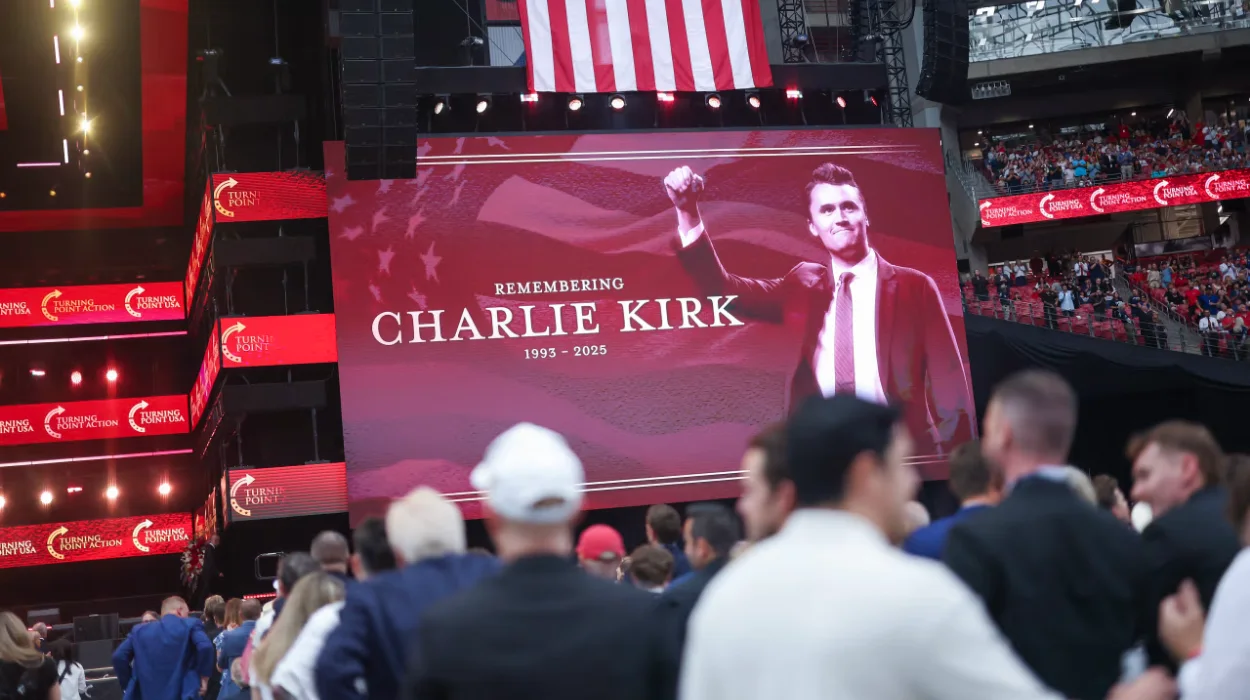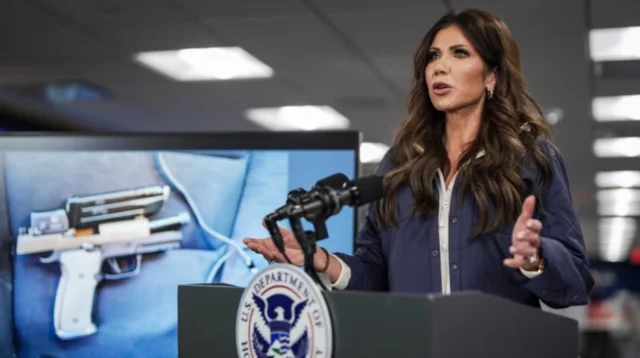In October 2025, the US government decided to cancel the visas of at least six foreign-born individuals who publicly cheered the assassination of conservative activist Charlie Kirk, sparking a discussion on the point of freedom of expression and the safety of the country. On September 10, 2025, Kirk, the 31-year-old co-founder of Turning Point USA, was killed during one of his speeches at Utah Valley University. The revocations were presented by the administration of president Trump as a needed deterrent of foreign nationals who claimed or supported violence against Americans.
The State Department in a statement said that it had no responsibility to accommodate foreigners who desired to hurt on the Americans. This message was indicative of a change in ideological scrutiny in the immigration enforcement. A number of them such as; South Africa music executive Nota Baloyi claimed that their U.S. visas were suddenly canceled because they had mocked the death of Kirk on social media. The broadness of this policy that covers online speech and other digital expressions has raised the questions of overreach by the policy among civil rights activists and international observers.
Although these measures by the administration are packaged as protectionist, they underscore an emerging trend in 2025 where governments have ventured the national security policy to digital speech regulation. This trend obliterates historically the distinction between domestic and international enforcement of the law and freedom of expression.
Visa Revocations As A National Security Measure
The revocation campaign coincides with a more general conservarative-led effort to respond to perceived online aggression against American personalities. Secretary of State Marco Rubio had verified that the State Department had approved proactive visa rejections and revocations of those who posted remarks praising, justifying, or downplaying the murder of Kirk. This step comes after an increasing focus on the use of social media based on social media monitoring to be considered a part of national security screening.
Consular officials were instructed by the Deputy Secretary of State, Christopher Landau, to implement greater levels of scrutiny concerning the digital activity of an applicant based on the necessity to avoid entry by persons whom he stated have a malicious intent towards the United States or American nationals. The rhetoric of the administration brings into focus an opinion that on-line speech may be indicative of offline danger thus warranting the use of pre-emptive offensive.
A call on corporations to cut off ties with employees who had rejoiced in the assassination made by Vice President JD Vance due process outside of the government and this is a sign of a grey area between political mobilization and national policy.
Legal Boundaries And Constitutional Challenges
Law researchers have raised concerns of whether the policy is against constitutional safeguards. Knight First Amendment Institute at Columbia University denounced the cancellations of visas as a discrimination of opinion, claiming that the government taking retaliation towards the speech, especially political speech, is detrimental to democratic standards.
Though historically courts have accorded the executive branch wide discretion when it comes to making decisions touching on immigration, the deportation or refusal to admit on the basis of an online speech creates unanswered constitutional questions. The first amendment guarantees the freedom of expression on American soil, as the application of this right to the non-citizens outside the country is a controversial issue in legal terms.
According to the argument of immigration attorneys, the revocations will have a chilling effect on the political commentary of people all over the world. To the immigrants who have already entered the United States, abrupt cancellation of visas on grounds of speech, instead of the ease of potential security threats, is a murky, uncertain aspect of immigration policies.
The Political And Social Dimensions Of The Response
In 2025, the assassination of Kirk was a political hotspot in American polarization. He was posthumously given the Presidential Medal of Freedom by President Trump as a martyr to the cause of truth and liberty. The death of Kirk was seen by his supporters as the symbol of a larger attack on conservative voices and criticized by its opponents who claimed that the administration used the tragedy to exercise even greater influence over ideas.
The visa revocations can be placed into such a political story, which symbolizes the government willing to penalize perceived disrespect of conservative personalities. Conservative media rejoiced at the move as an ethical stand against hate, and liberal commentators lamented the politics of slow censorship under the banner of security.
Impact On Diplomatic Relations
The cancellations have already strained relations with several nations whose citizens The cancellations have already deteriorated the relations with a number of countries whose citizens were impacted including South Africa, Brazil, Argentina, Germany, Mexico, and Paraguay. The demands on due process and fairness have led to some governments calling on the officials of the United States, seeking an explanation.
According to diplomatic analysts, such unicast moves particularly those that are based on subjective understanding of what is offensive speech may create a retaliatory action or make it difficult to engage bilaterally. The move by the United States actually globalizes the domestic political message in the United States, making social media commentary a possible catalyst to immigration ramifications.
The policy also questions the aspect of reciprocity because of the confusion of political speech and security threats. Countries that follow the precedent can take it upon themselves to refuse entry to Americans who have been found to cause critical speech on their rulers or national tragedies, as it may undermine the norms of free discussion between democratic nations.
Surveillance And Enforcement In The Age Of Social Media
The 2025 visa revocations can be used to show how digital platforms are now the centre of national security policy making. A change in direction toward visibility and deterrence instead of secrecy is indicated by the public release of images of foreign posts considered offensive by the State Department. Authorities refer to the project as an attempt to guarantee transparency and accountability, yet civil liberties groups view it as a show.
The absence of clarity with regard to the thresholds of enforcement is an area of conflict. The authorities have not indicated the number of visas that were canceled or what actions could be deemed as not acceptable online. According to analysts, this ambiguity is deliberate, and it is a disincentive against risky speech by creating an element of uncertainty that would deter it even in individuals who are not subject to the jurisdiction of the U.S.
The case is an example of a larger change in the international regulation of speech. The governments are increasingly considering the online commentary as intelligence that should be acted on instead of being simply expressed. The U.S. that was the strongest advocate of digital freedom, is presently collaborating with other countries in employing speech-based surveillance to promote security interests.
Broader Implications For Free Speech And Global Policy
The expanding practice of speech surveillance in immigration control is an indication of the problematic nature of digital communication in terms of its capacity to disrupt the spatial limits of the law. Remarks spoken thousands of miles away can now cause real-life effects on American soil. This relationship shows the strain between security protection and the openness of the current era of real-time global communication.
According to the scholars of technology, governments create the danger of confusing dissent with danger by broadening the definition of threat. The 2025 example demonstrates how a convergence of the political violence, social media, and international mobility can hasten policy responses accelerating the redefinition of the long-standing civil liberties.
The Future Of Transnational Speech Regulation
As more countries monitor online speech for visa vetting, a new form of “digital border control” is emerging. The precedent set by Washington may inspire similar measures worldwide, where digital footprints increasingly determine mobility. This evolution forces democracies to confront uncomfortable questions: Can nations defend against ideological hostility without silencing legitimate critique? And who decides the boundaries of acceptable speech in a networked world?
The United States’ decision to revoke visas over celebratory comments on Charlie Kirk’s death represents a landmark moment in the convergence of speech, technology, and security policy. It underscores how the digital age amplifies the reach of both expression and enforcement. As constitutional scholars and diplomats weigh the long-term consequences, the episode encapsulates a defining tension of 2025: how democracies can protect citizens against incitement without eroding the freedoms that distinguish them. The outcome of this debate will likely shape not only U.S. immigration and digital governance but the global standard for speech in an era where a single online post can cross borders and challenge the very principles it tests.





